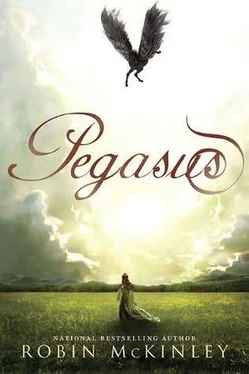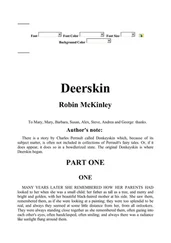She didn’t try to speak to any other pegasus, and none tried to speak to her. She felt that if she did try, she might fall down, as she had that evening she had first spoken to Niahi and then Lrrianay. She felt that despite the things that wouldn’t change—the two legs, the big hands with the rotating wrists, the lack of wings—that she was less secure in her humanness than she had been before she visited Rhiandomeer, and that was exactly what she dared not risk revealing. She dared not risk trying to speak to a pegasus. And—changed as she was in other ways—she dared not risk the despair if she failed.
She wondered if Lrrianay had said anything about her to the other pegasi at the palace, about what had happened to her in Rhiandomeer—and if so what might he have said? Had he told them not to try to speak to her—she the wingless biped who had spent five days in the Caves, who, in Rhiandomeer, could speak to all the pegasi, and not only to Ebon? Had Lrrianay guessed about the despair? Or was it only that Lrrianay agreed with Hibeehea—although Lrrianay had, in the end, said nothing about what Hibeehea had told her. Lrrianay’s last words to her had been on the morning of her flight home, merely: Thank you for coming. And she had replied, Thank you for having me. Her aunt or her uncle might have said just the same, and she responded the same, at the end of one of her visits to her cousins.
But her state of mind was not as important as the fact that any hint of communication between the princess returned from Rhiandomeer and any other pegasus than the one she was so strangely bound to would be reported directly and immediately to Fthoom. Fthoom, the powerful and power-mad, Fthoom, about whom a petition was gathering support and signatures, calling for him to be reinstated in his former place of authority and influence in the king’s council; Fthoom, who hated her.
She thought Lrrianay was avoiding her—but she knew she was avoiding him. From the outside, she thought, the pegasi looked just as before—formal, aloof, polite, perhaps kind, but disinterested. That was a good thing, she reminded herself. She was supposed to pretend—to appear —that nothing had happened except that she had been gone for three weeks; except that she had made history. I won’t make any of the kind of history anybody will have to learn later. I promise, she had said to her father. And he had replied, Be careful of your promises. I’m not going to hold you to this one.
The pegasi she met were careful to acknowledge her—but the pegasi were always careful to acknowledge any human bound to one of their own, and any pegasus in the palace grounds knew who the bound humans were. She wondered, as she punctiliously responded to pegasus acknowledgements, just as punctiliously as she responded to human acknowledgements, how many of the pegasi disapproved of her visit to their country. Was it that she was human, and was accustomed to reading human gestures and expressions, that she so often knew immediately which humans disapproved of her journey, or was it that humans made their disapproval so obvious? She could not read the pegasi any more—was that because she had lost what she had learnt of them in Rhiandomeer, or was it that they held themselves differently—as she felt she held herself differently—here in Balsinland?
She could almost hear Ebon saying, Disapprove? That’s another of your human things. What’s it for? Once something’s been decided, that’s it, isn’t it?
But what if someone—call it dislike rather than disapprove? Hibeehea didn’t like me talking to the queen when I first arrived. Hibeehea didn’t want me to come at all. . . .
But she couldn’t hear his answer. Faintly she heard Redfora’s voice, but she couldn’t hear the words she said—and furthermore she knew she was making it up, to comfort herself.
She said aloud, “ Gonoarin, wheehuf ”—“the best of good days, noble sirs, noble madams”—making the correct human motions with her human hands. She could say the pegasi vowels, the ff ’s , the mrr ’s, better now than she had been able to a month ago. This much at least she could keep of her journey; a few clear superficial words, a slightly greater fluency with sign.
The pegasi bowed their heads to her so that their long manes swept forward like curtains of silk: beautiful, remote, unknowable.
Of course she never went near the pegasi annex. She had no reason to.
Once she met Hirishy alone, outside her mother’s rooms. She paused to make her bow and when she raised her head Hirishy was very close to her, reaching out one tiny feather-hand to stroke her cheek. Sylvi thought—she almost thought—she heard Oh, poor sweetheart— and in her mind she saw, briefly but so vividly she could not, could not, have imagined it, one of the cultivated hill-meadows of the pegasus land. There were pegasi hoeing between the little green rows, and a pavilion at one corner of the field: a simple, comforting, homey scene, nothing demanding or formidable, like the Caves, or the Dreaming Sea . . . or the palace where they stood.
And then Waina, who was one of the ladies-of-the-queen’s-chamber on duty that week, opened the door. Hirishy moved unhurriedly away from Sylvi’s side, nodded a slow human-style nod to Waina, and stood waiting for Sylvi to precede her through the door. The moment—whatever it had been—was over.
Sylvi had been rather hopelessly making notes toward the presentation she was going to have to give about her journey, writing down three things she thought she could talk about and then crossing two of them off again. It would be so much easier to have a pegasus to ask, she thought.
She sighed, and pushed herself away from the table, and went and sat on the window-sill. She had been given her own office when she began to work on dams and waterways, so she could receive reports and have a place to unroll the charts and diagrams that various people brought her. She had been offered rooms on the ground floor, where most of the rest of her family had their offices, but she had wanted something as high up as possible and was in fact in an attic.“I may try that,” her father said. “Anyone who will climb four flights of stairs to consult me must really want my advice.”
The attics had only slightly lower ceilings than the rest of the palace—and the wind that came through the windows tasted a little more like free air than house air, although when she had chosen the rooms almost four years ago she’d chiefly been interested in the view. She looked out over one of the palace’s smaller courtyards, then the outthrust bulk of the Great Hall, with a curl of old trees softening its outline. Beyond it there was parkland, and beyond that she could see the faint haze over the practise yards—and very far away, the thick dark line that was the Wall.
She sighed again, and had just stood up to go back to her desk when there was a quick knock on the door—and the head that was put round it was Danacor’s.
“Oh!” she said, and ran to throw her arms around him, her mood lightening immediately.
“How’s my favourite sister?” he said, smiling, but when she looked up at him she thought he looked tired and worried.“I’m sorry I wasn’t here for your arrival. How did it go? Or is that a bad question?” And he looked at her table. “When’s your presentation?”
“Three days,” she said glumly. “Three days before the party.”
“Dad’ll have scheduled it before you left. And written the list of questions. Which he wrote an addendum to after he got back, am I right?”
There was a list of questions, and there was an addendum, but her father had said, “These are only because I can’t help myself. This is your report. Tell us what you choose to tell us.” She had looked at him quickly and looked away. Lrrianay was standing just behind him; if she looked into her father’s face she risked catching Lrrianay’s eye. Fazuur sat at a table set end-on to Corone’s desk. He looked up from the papers he was reading and smiled at her.
Читать дальше












